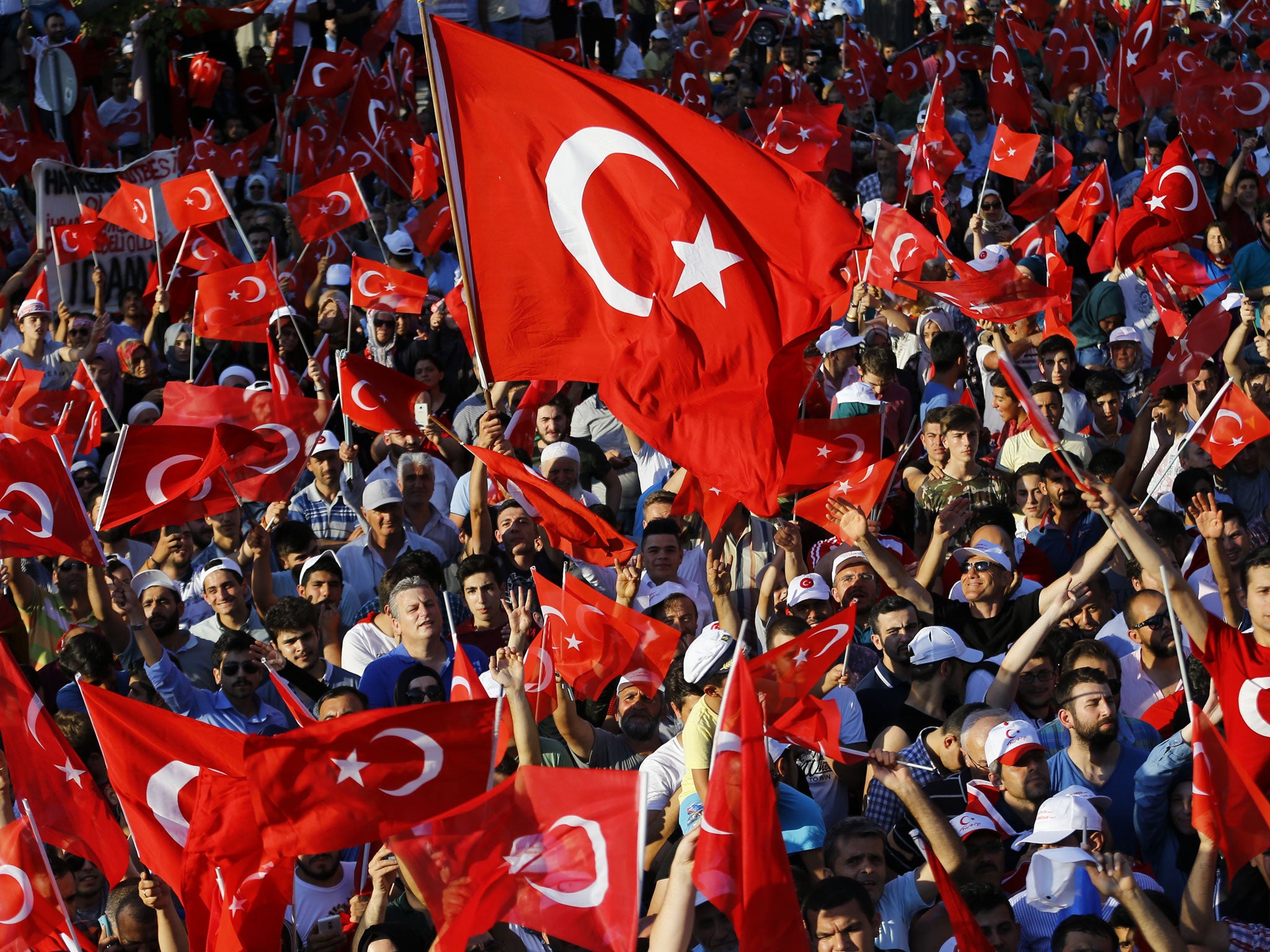Turkey coup: Tensions between US and Erdogan administration rise after failed power grab
US Secretary of State John Kerry has denied the US played any part in Turkey's attempted coup, calling such claims 'utterly false and harmful'

Tensions between Turkey and the US have escalated following the attempted coup against the Erdogan administration, with the country's leader demanding the extradition of a US-based cleric accused of orchestrating the violence. Another senior official has directly blamed the United States.
The Obama administration has strongly denied any involvement or responsibility in recent events in the country. In a phone call to his counterpart in Turkey, US Secretary of State John Kerry said: “Public insinuations or claims about any role by the United States in the failed coup attempt are utterly false and harmful to our bilateral relations."
The warning came after Turkey closed its airspace, thereby effectively grounding US warplanes which have been targeting Isis forces in neighbouring Syria and Iraq.
Earlier today, Turkey's justice minister Bekir Bozdag announced that some 6,000 people have now been detained in a government crackdown on suspected opponenents and dissenters following the coup.
In a television interview Minister Bozdag said: "The cleansing [operation] is still continuing. Some 6,000 detentions have taken place. The number could surpass 6,000."
At the centre of the controversy stands Fethullah Gulen, who lives in exile in Pennsylvania and promotes a philosophy that blends a mystical form of Islam with staunch advocacy of democracy, education, science and interfaith dialogue.
In a televised speech on Saturday, President Erdogan said Turkey had never rejected a US extradition request for “terrorists.” Addressing Washington, he requested the handover of Gulen and said, “If we are strategic partners, then you should bring about our request.”
Addressing Barack Obama on Saturday, the Turkish Prime Minister Binali Yildirim said: “Any country that stands behind him is no friend of Turkey, is engaged in a serious war with Turkey. Today, after this coup attempt, I’m once again calling on you, I’m saying: Extradite this man in Pennsylvania to Turkey now."
Suleyman Soylu, Turkey's labor minister, went further than Erdogan, suggesting the U.S. was behind the coup. "The US is behind the coup attempt. A few journals that are published there [in the US] have been conducting activities for several months. For many months we have sent requests to the US concerning Fethullah Gulen. The US must extradite him," he said.
Gulen has condemned Friday night's coup attempt by military officers that resulted in a night of explosions, air battles and gunfire that left dozens dead. Erdogan's government said Gulen directed the coup all the same.
Although he didn't outline any threat, Erdogan's emphasis on US-Turkish counterterrorism cooperation raised the prospect of a prolonged closure of the Incirlik air base in southern Turkey if he didn't get his way. The Pentagon said it was trying to get permission to resume air operations from the base, while adjusting mission operations in the meantime.
In their second call in as many days, Turkish Foreign Minister Mevlut Cavosoglu told Kerry the government was in control of state institutions.
Kerry reiterated U.S. support for Turkey's democratically elected government, according to the State Department readout, and urged authorities to respect the rule of law and safeguard civilian life as they respond to the coup attempt. Kerry also said Turkey needed to respect due process as it investigates those it believes were involved in the plot.
Earlier, on a visit to Luxembourg, Kerry told reporters the U.S. would entertain an extradition request for Gulen if the Turks provided evidence of wrongdoing. Erdogan has long accused Gulen, a former ally, of trying to overthrow the government, but Washington has never found the claims compelling.
“We fully anticipate that there will be questions raised about Mr. Gulen,” Kerry told reporters. “And obviously we would invite the government of Turkey, as we always do, to present us with any legitimate evidence that withstands scrutiny. And the United States will accept that and look at it and make judgments about it appropriately.”
Gulen is understood to maintain significant support among some members of the military and mid-level bureaucrats. His movement called Hizmet includes think tanks, schools and various media enterprises. Gulen and Erdogan only became estranged in recent years.
A Turkish official, speaking on condition of anonymity in line with government regulations, said Turkey was preparing a formal extradition request with detailed information about Gulen's involvement in illegal activities. He said the coup attempt was seen as “one more thing to add to an already extensive list.”
In a statement, Gulen said he condemned, “in the strongest terms, the attempted military coup in Turkey” and sharply rejected any responsibility or knowledge of who might be involved.
At a news briefing Saturday in Saylorsburg, Pennsylvania, the cleric noted that he has been away from Turkey for more than 15 years and would not have returned if the coup had succeeded. He cited greater freedoms in the United States as a reason.
“In brief, I don't even know who my followers are,” the frail-looking cleric said through an interpreter. “You can think about many motivations of people who staged this coup.”
The coup failed after appearing not to have been backed by the most senior ranks of the military. Turkey's main opposition parties, too, condemned the attempted overthrow of the government. Prime Minister Benali Yildirim said 161 people were killed and 1,440 wounded in the overnight violence. He said 2,839 plotters were detained.
Kerry said the U.S. had no indication beforehand of the coup attempt, which began as he and Russia's foreign minister were in a Russian government villa in Moscow, locked in negotiations over Syria.
“If you're planning a coup, you don't exactly advertise to your partners in NATO,” Kerry said. “So it surprised everyone. It does not appear to be a very brilliantly planned or executed event.”
Join our commenting forum
Join thought-provoking conversations, follow other Independent readers and see their replies
Comments